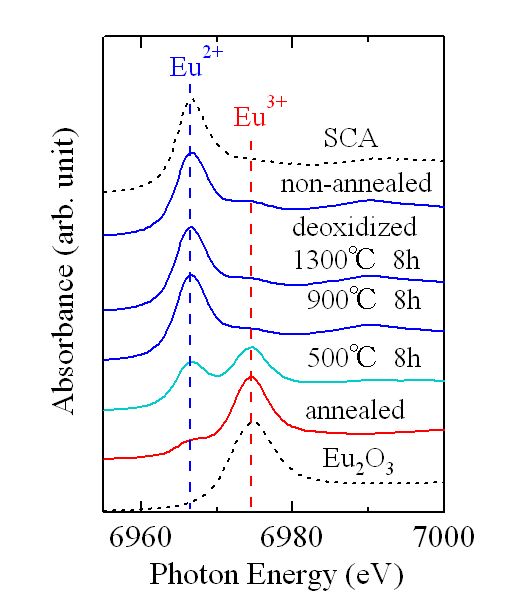Valence of blue phosphor BAM
Inquiry number
SOL-0000000888
Beamline
BL19B2 (X-ray Diffraction and Scattering II)
Scientific keywords
| A. Sample category | inorganic material |
|---|---|
| B. Sample category (detail) | insulator, ceramics, crystal |
| C. Technique | absorption and its secondary process |
| D. Technique (detail) | XAFS, XANES |
| E. Particular condition | polarization (linear), room temperature |
| F. Photon energy | X-ray (4-40 keV) |
| G. Target information | chemical state, electronic state, trace element |
Industrial keywords
| level 1---Application area | display |
|---|---|
| level 2---Target | PDP、FED |
| level 3---Target (detail) | phosphor |
| level 4---Obtainable information | electronic state, valence, chemical state |
| level 5---Technique | XAFS |
Classification
A80.30 inorganic material, M40.10 XAFS
Body text
In this solution, Eu LⅢ-edge XANES technique was applied to a blue-light-emitting europium-doped BaMgAl10O17(BAM) to analyze the valence of doped europium. XANES spectra reveal the valence of the target atom. These data reveal the fact that the mechanism of fading of blue light emission from BAM and revival of oxidized BAM by annealing in a reducing atmosphere.
Eu LⅢ-edge XANES spectra of BAM
Source of the figure
Private communication/others
Description
本間作
Technique
XANES is a unique technique to study electronic state and local structure. The technique is applicable to crystal, amorphous, liquid contained a very small quantity of elements and provides knowledge about the valence and local structure of the element.
Source of the figure
No figure
Required time for experimental setup
2 hour(s)
Instruments
| Instrument | Purpose | Performance |
|---|---|---|
| XAFS | acquisition of XAFS spectrum | 3.8keV-72keV |
References
| Document name |
|---|
| X線吸収分光法-XAFSとその応用-太田俊明編 |
Related experimental techniques
XMCD
Questionnaire
This solution is an application of a main instrument of the beamline.
Ease of measurement
Middle
Ease of analysis
Middle
How many shifts were needed for taking whole data in the figure?
Less than one shift
